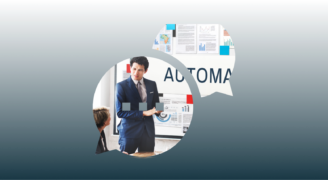Supermarkets are highly competitive. To thrive in this fast-changing space, supermarkets need a centralized structure capable of controlling different departments, managing inventory, and labor. An Enterprise Resource Planning (ERP) software makes it possible to centralize functions and information to standardize all major processes associated with the supermarket business.
How ERP Makes a Difference in the Supermarket Business?
Almost all supermarkets have an accounting system and an inventory management system in place. But do these disparate systems talk to each other? Do they share data and help in making key decisions?
Chances are very low. Here the need for an ERP system comes alive. In this digital age, the need for systems to communicate with each other in real-time is necessary and ERPs can assure that and more.
An ERP system is a single platform that can centralize information and streamline operations so that the business can boost productivity. So how does an ERP system make all this possible for a supermarket?
ERP systems nowadays come with a wide range of in-built tools and modules. A standard ERP system can manage all your business needs like:
• Purchasing
• Managing Inventory
• Supply-Chain Management and Logistics
• Handling Multi-Location Stores
• Manage Pricing, Discount Offers
• Predict Seasonal Demands and More
Having a 360-degree view of all these operations in real-time will improve productivity and eliminate redundancies.
Benefits of Using an ERP System
Supply chain management is an integral part of the supermarket business. Let’s understand how an ERP system can manage this complex process.
• An efficient ERP system transforms the standard supply chain into a reactive supply chain. Through this method, the stock replenishments happen promptly as the distributors and logistics providers are always kept in the loop, and whenever the stock depletes they are notified immediately.
• Market trend analysis is another core feature of ERP systems. The system can foresee the seasonal change in the customer requirements. Thus, the inventory team stays ahead of the demand.
• Visibility across multiple channels - like raw materials providers, manufacturers, and stock managers.
• Physical stores can also take advantage of ERP for strategic planning of demand and supply.
Let’s understand some of the core areas where an ERP system has a quick impact:
1. Availability of Business Information
Information is spread across multiple entities in an ERP-less environment. ERP helps in merging the information from various sources- like inventory, sales, purchase, etc and provide a unified answer to the key stakeholders in real-time through a single platform.
This is done with the help of a centralized database that can integrate all the applications involved and help the management make data-driven decisions promptly.
2. Improved Stock Management
Having a clear idea about product availability can’t be stressed enough in the supermarket business. ERP ensures the ability to restock promptly with the help of inventory forecasting tools. This tool digs into historical sales trends and presents product amount estimation for the store to restock. In this way, supermarkets can eliminate the possibility of not fulfilling customer demands.
3. Enhanced Inventory Purchase
By integrating the purchase system with the inventory system, stock alerts can be set up to display when the inventory level is low. Approval matrices make purchase management easier because it reduces wait time to a large extent. This means the purchasing staff no longer need to wait for their manager to approve the purchase requests and the manager will have all the information he needs on his dashboard regarding requests to approve or stock level in the same ERP system.
4. Agile Transaction Process
ERP systems for supermarkets normally come with in-built POS(point of sale) systems. These systems automatically record every transaction thus reducing the chances of human error.
The POS system will improve the transaction time as it reduces customer wait time and feeds real-time data into the ERP system. This data can then be scrutinized by the management team to understand the performance of the supermarket.
5. Customer Relationship Management (CRM)
Addressing customer grievances is now easy with an ERP system. An effective ERP system collects customer data like personal information, purchase history, preferences, etc, and derives meaningful trends from them. This may further be used in personalized marketing strategies to maintain meaningful customer relations.
6. Pricing and Discounts
Managing pricing and discounts is essential in the supermarket business because of its dynamic nature. Competitive pricing is necessary for a supermarket that has a wide range of products.
ERP automates the pricing management and stores the pricing history including discounts. Employees at the cash register/POS can easily calculate the price and discounts according to the customer in an efficient and detailed way.
7. Tracking Products
The supply chain management of a supermarket business consists of various stages like product shipping, product return, contact management, and product transportation. To ensure a seamless flow, all these activities need to be tracked, and ERP’s normally use Lot number or Serial number tracking for effective management of goods.
8. Expiry Date Management
In the supermarket business sorting products based on their expiry dates is essential. An ERP system can track products using the batch number and expiry date. This process ensures efficient shelf-life tracking and reduces wastage. Activities like product recall and returning the product to the vendor can all be automated on time through an ERP system.
Netsuite for Supermarket
Oracle Netsuite ERP is a cloud-based platform that can effectively streamline all your business activities. Supermarket businesses can make use of NetSuite to manage various processes like order management, inventory tracking, account management, and more.
Some of the major features of NetSuite are listed below:
Improve In-store POS
• NetSuite provides a 360-degree view of the customer.
• Real-time inventory visibility across multiple channels.
• Reduce fraud with multiple lines of security for cashiers and managers.
• Personalized discounts for customers based on purchase history.
• Reduce the gap between retail POS and eCommerce platforms of the business.
• Improve store operations by integrating back-end processes.
• Equip your sales personnel with the right tools to form meaningful customer relationships.
Business Intelligence
• NetSuite will provide quick insights regarding various channels through a single platform.
• Make real-time decisions regarding various channels, inventory, suppliers, and customers.
• Role-specific dashboards help provide data about the core processes that are associated with the role.
• Create customized reports and KPI (Key performance indicators) that fit in with the business process.
Manage Inventory and Supplier Relations
• Real-time inventory management across all channels like warehouses, stores, and drop-ship locations.
• Manage multi-warehouse inventory.
• Monitor transfers between various locations.
• Improved supplier-vendor relations.
• Vendors have more visibility into company payments through the supplier portal.
• Delivery date management to meet supply.
SuiteSuccess for Supermarkets
Which is the right NetSuite product for running a supermarket effectively? NetSuite SuiteSuccess is the answer. Understanding the major challenges faced by retail or supermarket business NetSuite developed SuiteSuccess primarily focusing on the following elements.
1. Continuous Customer Lifecycle Engagement
2. Deep knowledge of the leading practices in Retail
3. Agile and intelligent phased approach
4. Business intelligence
SuiteSuccess provides a single view of the major factors affecting the growth of the business. Say, Customers, Orders, Items, and Inventory. This real-time platform helps to lead the business. It also helps to deliver a 360degree customer experience facilitating improved growth margins.
If you wish to implement a user friendly, easily accessible cloud ERP system in your organization quickly, or if you wish to get more information, get in touch with the experts of Jobin & Jismi.



